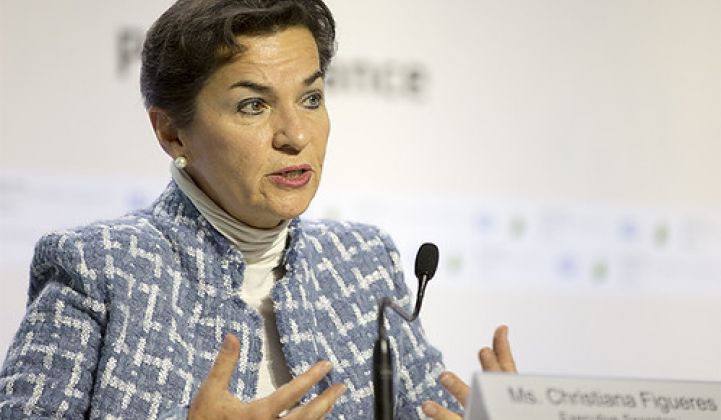Green recovery funds offer a “once-in-a-lifetime” opportunity to tackle climate change, according to former U.N. climate chief Christian Figueres.
Countries around the world face a moral imperative not to squander COVID-19 pandemic economic recovery funds, Figueres said at the Reuters Energy Transition Europe event on Monday.
“We will not be able to borrow $12 trillion again. This is it; this is a once-in-a-lifetime opportunity,” she told Reuters’ Axel Threlfall. “Let’s remember that we are borrowing this money. You and I will not pay that back; it is our children and our grandchildren who will pay it back. We better make darn sure that we invest it for future generations’ well-being and certainly not for their detriment.”
While recovery funds pledged around the world thus far total $12 trillion, only a portion of that has the dual-purpose label of “green recovery.”
“Currently the leader on green and inclusive recovery funding is the EU,” said Figueres, noting that the EU had recognized that the right measures could address both the climate and economic challenges in tandem.
The EU has pledged to direct 30 percent of its €1.8 trillion ($2.1 trillion) budget for 2021-2027 to clean-energy projects, while the entire budget is subject to the principle of “do no climate harm.”
Funds in the EU are in addition to national recovery funds, where Germany and France are leading the way. France is planning to invest €30 billion over the next two years in the green recovery. In Germany, €40 billion of its €145 billion stimulus package will be devoted to what it terms "green" investments.
European plans include funding for green hydrogen projects and accelerating the rollout of electric vehicles.
Can climate bring the U.S. and China together?
President-elect Joe Biden’s incoming administration and the expected return of the U.S. to the U.N. climate table was raised in Monday's discussion.
Since taking the role of executive secretary of the U.N.’s climate body in 2010, Figueres steered negotiations from the aftermath of the failed Copenhagen talks through to the summer following the signing of the 2015 Paris Agreement — no mean feat. The geopolitics of climate change have shifted dramatically since then, as demonstrated by President Xi Jinping of China recently setting a net-zero target to be reached by 2060.
Figueres noted that China's decision to take this step, even as the Trump administration moved away from global climate-change engagement, shows that the target is not dependent on a quid pro quo with the U.S.
She also pointed out that President Xi’s September speech setting the target cited reaching a peak in China's carbon emissions “before,” not by, 2030, and reaching net-zero carbon emissions “before” 2060, not by that date. The substitution of that one preposition for another leaves some headroom for more ambition, she said.
With Biden now the president-elect and a $2 trillion climate plan on the way, climate change could be a useful diplomatic tool to bring China and the U.S. back together — or at least a little closer.
“A smart approach could be to reach out to China on climate change [related] mutually beneficial topics and challenges, and to begin to build a bridge at the margins of other issues," such as human rights and trade, she said. "It’s a promising space for U.S.-China relations."




